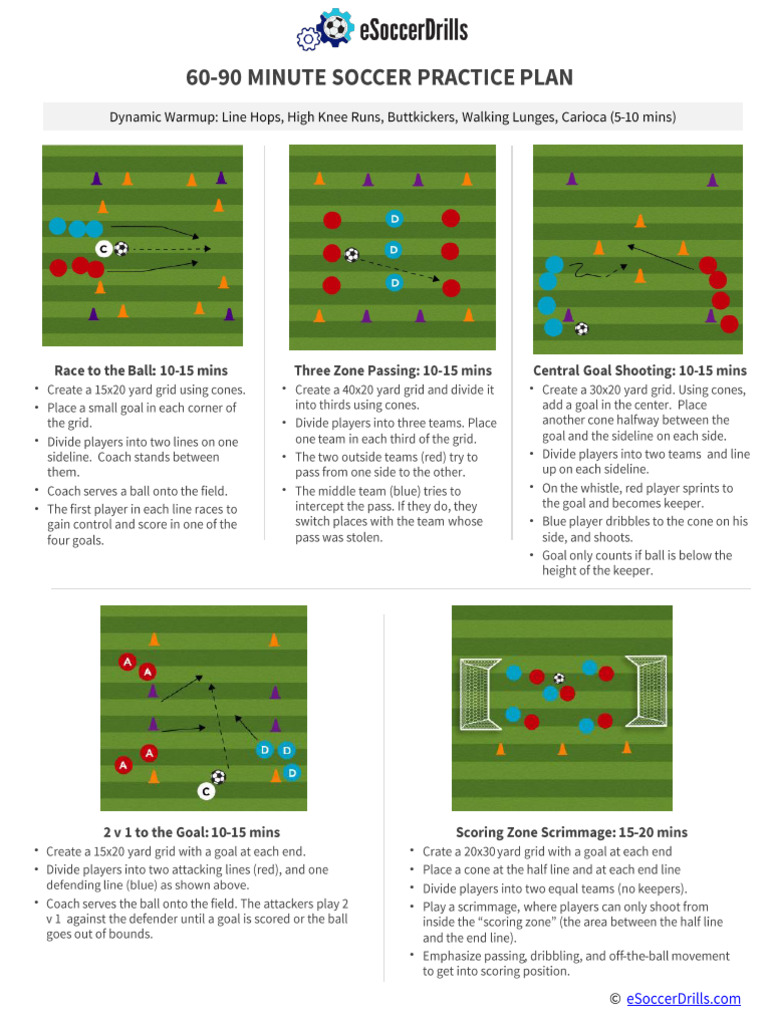In the realm of youth sports, soccer stands as one of the most popular choices for young athletes. Among children, the age of six is a crucial developmental phase, making it an opportune time to introduce foundational skills and instill a love for the game. A well-structured soccer practice plan is essential for fostering enthusiasm and ensuring growth. This article will explore an engaging practice plan tailored specifically for six-year-old soccer players, emphasizing various types of training and activities that can promote learning and enjoyment.
To begin, it is imperative to understand the importance of creating a lively and fun environment for young players. At this tender age, children thrive on playful interactions. Thus, incorporating games and activities that maintain their interest is vital. A practice plan should ideally combine skill development, physical fitness, and enjoyment, enabling children to develop not only their sports abilities but also social skills and teamwork.
Warm-Up Activities
Every practice ought to commence with an invigorating warm-up to prepare young bodies for the physical demands ahead. Engaging young athletes in dynamic stretching and movement games can enhance flexibility and coordination. Simple activities such as “Simon Says,” where players mimic movements suggested by the coach, can serve as an effective warm-up. This not only engages their minds but also subtly prepares their muscles for more strenuous activities.
Skill Development Drills
The heart of any practice plan for six-year-olds should focus on developing essential soccer skills. Fundamental skills such as dribbling, passing, shooting, and defending are key components. These skills can be introduced through a series of engaging drills, each tailored to align with the cognitive and physical abilities of young players.
For example, consider a dribbling drill where players navigate a series of cones. By challenging them to weave in and out while maintaining control of the ball, children learn vital dribbling techniques while enhancing their motor skills. This drill can be transformed into a fun relay race, where teamwork plays a central role, fostering a competitive yet friendly atmosphere.
Passing is another crucial skill that should be emphasized. A simple passing drill where players form a circle can be highly effective. Each child takes turns passing the ball to their neighbor while focusing on accuracy and technique. This activity not only develops passing skills but also encourages communication among players, reinforcing camaraderie.
Fun Games for Skill Reinforcement
Integrating fun games into the practice sessions is essential for reinforcing the skills learned. For young athletes, creating an enjoyable context is key to maintaining engagement. Games such as “Sharks and Minnows” can be particularly beneficial. In this game, one or two players are designated as “sharks,” while the others, the “minnows,” dribble their soccer balls from one end of the field to the other without getting tagged. This game promotes dribbling in a fun and exciting way, while also enhancing spatial awareness and agility.
Another game that can be of tremendous value is “Red Light, Green Light.” Players dribble their soccer balls as the coach calls out commands. “Green Light” means to move forward, while “Red Light” prompts them to stop immediately. This drill enhances ball control and teaches children to respond quickly to commands, all while maintaining an element of playfulness.
Teamwork and Social Skills
An integral aspect of any youth soccer practice is the cultivation of teamwork and social skills. Activities that foster cooperative play should be interwoven within the session. Small-sided games, where children are divided into teams playing with fewer players than a standard match, can be an effective strategy. This not only encourages participation but also enhances each child’s opportunity to develop their individual skills within a team context.
Etiquette during practices is another essential component. Teaching children the importance of sportsmanship, respect for opponents, and appreciation for teammates can be imparted during brief discussions between drills. These lessons are foundational, extending beyond the soccer field into everyday life and making young athletes not just better players, but better individuals.
Cool Down and Reflection
Following an engaging practice, a cooling down phase is essential. Gathering players for gentle stretching exercises allows them to reflect on the skills they’ve learned while promoting flexibility and muscle recovery. This phase can be an excellent opportunity for coaches to provide positive reinforcement, highlighting individual achievements and overall team improvement.
Incorporating a moment for reflection can foster a sense of accomplishment. Coaches can ask players to share their favorite part of the practice or a skill they want to improve. This simple act of reflection not only promotes self-assessment but also solidifies the bond among teammates and the coach.
Conclusion: A Holistic Approach
For six-year-olds, soccer provides more than just a game; it offers an avenue for personal growth, social interaction, and physical fitness. A well-prepared practice plan that incorporates varied activities—warming up, skill drills, fun games, and a cool down—can create an enriching experience that nourishes young athletes. By emphasizing enjoyment and skill development, coaches and parents can nurture a generation of players who are not only skilled but also passionate about soccer. This approach will lay the groundwork for the future stars of the sport, ensuring that their journey in soccer is just as enjoyable as it is educational.
